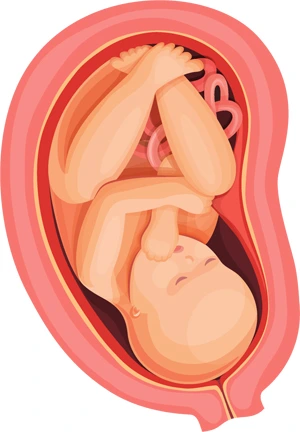In the ninth and final month of pregnancy, the journey comes to its culmination as the anticipation for the baby’s arrival intensifies. At this stage, the baby is fully developed and ready for birth. Mothers may experience a range of emotions, from excitement to nervousness, as they prepare for labor and delivery. The baby’s movements may slow down as they settle into the head-down position in the pelvis. Expectant mothers often feel increased pressure on the bladder and pelvic area, leading to more frequent urination and discomfort. Mothers must prioritize self-care, get plenty of rest, and stay well-hydrated. Regular check-ups with healthcare providers become even more important as the due date approaches to monitor both maternal and fetal well-being.
Table of Contents
ToggleWhat are the common symptoms during the 9th month of pregnancy?
Common symptoms during the 9th month of pregnancy may include:
- Frequent urination
- Swollen legs, ankles, and feet
- Tingling or numbness in fingers and hands (Carpal Tunnel Syndrome)
- Back pain
- Pelvic pressure
- Braxton Hicks contractions
- Nesting instincts and surge of energy
- Mood swings and emotional changes
- Skin changes such as dryness, flakiness, or increased sensitivity
- Sleeplessness and fatigue
- Breast leakage
What are the inside and outside changes in the 9th month of pregnancy?

Baby’s Development in the 9th month
In the ninth month of pregnancy, the baby’s development is near completion, and they are ready for the journey into the world. At this stage, the baby is fully formed, with all major organs and systems in place. The baby’s lungs are now mature, and they continue to accumulate fat for temperature regulation after birth. In preparation for delivery, the baby typically settles into a head-down position in the mother’s pelvis. While the baby’s movements may decrease due to limited space, expectant mothers might still feel subtle shifts and hiccups. Mothers need to prioritize their well-being with proper nutrition, hydration, and rest during this crucial period. Regular prenatal check-ups remain vital to ensure a smooth and healthy delivery.
Changes to the Body
In the ninth month of pregnancy, the body undergoes profound changes as it prepares for the imminent arrival of the baby. The baby bump is at its largest, and mothers may experience increased pressure on the bladder and pelvic area. Braxton Hicks contractions, which are practice contractions, may become more noticeable as the body readies itself for labor. Backaches and discomfort are common as the baby descends into the pelvis. Swelling in the ankles and feet may persist, and some women may notice increased fatigue. Adequate rest, staying hydrated, and maintaining a nutritious diet are crucial during this period. Regular prenatal check-ups become even more critical to monitor both maternal and fetal well-being as the due date approaches
What is the quick list on the 9th month of pregnancy?
During the 9th month of pregnancy, there are several important tasks to consider as the due date approaches.
- Organize child care after the baby arrives
- Finalize preparations for the baby’s arrival, including stocking up on baby essentials like clothes, diapers, and bottles
- Wash baby’s clothes with newborn laundry detergent
- Prepare meals and freeze them for post-delivery convenience
- Install the baby’s car seat and get it inspected
- Consider taking a non-stress test and a biophysical profile if needed
- Be aware of your baby’s movements and report any decrease in movement to your doctor or midwife
- Write down your pregnancy memories
- Learn about the fourth trimester and prepare for breastfeeding
What are some things to avoid during the 9th month of pregnancy?
As you approach the ninth month of pregnancy, it’s crucial to be cautious and prioritize your well-being.
- Strenuous Activities
- High-Impact Exercise
- Caffeine and Sugary Foods
- Processed Foods
- Unpasteurized Dairy and Soft Cheeses
- Excessive Salt Intake
- Alcohol and Tobacco
- Ignoring Signs of Labor
- Overlooking Decreased Fetal Movement
- Neglecting Hydration
Last Updated on January 14, 2024
Written By
With a solid foundation in family dynamics, child development, and a knack for assessing products, our content is built on a strong grasp of our topics. We use trustworthy sources, seek advice from experts, and stay current with the latest happenings in our fields. We always give credit to our sources, reveal any possible conflicts of interest, and deliver info in a truthful and unbiased way. Follow us on Facebook or join our Facebook Group.
Start your journey to confident parenting
Join over 2,000+ parents who receive free practical advice and tips from Joyful PH. Unsubscribe anytime.
You may also like
Third Trimester Pregnancy (28-40 Weeks)
The third trimester of pregnancy, spanning from 28 to 40 weeks, marks the final…
Second Trimester Pregnancy (14-27 Weeks)
The second trimester of pregnancy, spanning from 14 to 27 weeks, is often…
First Trimester Pregnancy (0-13 Weeks)
During the first trimester of pregnancy, spanning from 0 to 13 weeks,…
8 Months Pregnancy
In the eighth month of pregnancy, the baby is getting ready for birth, and the…
7 Months Pregnancy
During the seventh month of pregnancy, significant milestones occur. The baby's…
6 Months Pregnancy
In the sixth month of pregnancy, significant developments continue as the baby…







